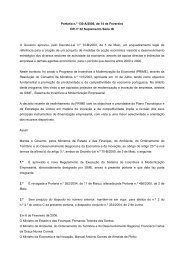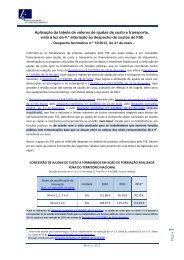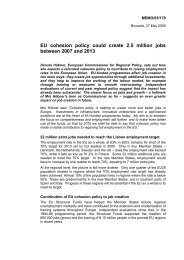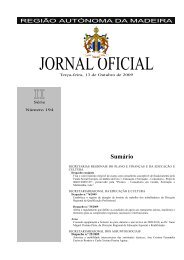Industrial Relations in Europe 2012 - European Commission - Europa
Industrial Relations in Europe 2012 - European Commission - Europa
Industrial Relations in Europe 2012 - European Commission - Europa
You also want an ePaper? Increase the reach of your titles
YUMPU automatically turns print PDFs into web optimized ePapers that Google loves.
Consider<strong>in</strong>g the exist<strong>in</strong>g pay reductions and cont<strong>in</strong>u<strong>in</strong>g staff reductions, some trade union members<br />
have been ambivalent about the agreement and concerned that their scope to <strong>in</strong>fluence employer<br />
decisions would be limited. There has been unease that a large number of early retirements and a<br />
recruitment moratorium is lead<strong>in</strong>g to staff shortages. The implementation body, however, reported<br />
<strong>in</strong> June <strong>2012</strong> that sav<strong>in</strong>gs <strong>in</strong> the order of EUR 891 million had been achieved dur<strong>in</strong>g 2011-12 <strong>in</strong><br />
addition to the EUR 597 million delivered <strong>in</strong> 2010-11. Staff numbers had fallen substantially,<br />
service reconfiguration had commenced and <strong>in</strong>dustrial peace had been ma<strong>in</strong>ta<strong>in</strong>ed. There has been<br />
some question<strong>in</strong>g of the appropriate balance to be struck between cutt<strong>in</strong>g public service staff<strong>in</strong>g and<br />
reduc<strong>in</strong>g pay and there is some uncerta<strong>in</strong>ty about if cuts <strong>in</strong> allowances would breach the agreement.<br />
In November <strong>2012</strong>, talks between the government and trade unions began on an extension of the<br />
agreement. The new talks centre on fresh reforms to extract a further €1 billion worth of sav<strong>in</strong>gs<br />
from public sector costs by the end of 2015. The government says the cuts are vital, but<br />
acknowledges that the process will not be easy.<br />
In other countries also affected by severe fiscal consolidation, a much less positive picture emerges,<br />
frequently blend<strong>in</strong>g elements of government unilateralism, unsuccessful attempts at consultation,<br />
comb<strong>in</strong>ed with some agreements on specific components of reform such as pension provision. The<br />
case of Greece <strong>in</strong>dicates the absence of social dialogue and policy has been decided unilaterally by<br />
emergency decree with virtually no attempt to <strong>in</strong>volve the social partners. The fragile and uneven<br />
<strong>in</strong>stitutionalisation of collective barga<strong>in</strong><strong>in</strong>g <strong>in</strong> the public sector has been suspended, result<strong>in</strong>g <strong>in</strong><br />
susta<strong>in</strong>ed, politicised, mobilisation aga<strong>in</strong>st austerity (Ioannau <strong>2012</strong>). Severe restrictions on social<br />
dialogue and failure to reach agreement on a new public sector pay system has also characterised<br />
the experience of Bulgaria and Romania (Vasile <strong>2012</strong>).<br />
In Spa<strong>in</strong>, the government was committed to social dialogue and set out a jo<strong>in</strong>t response to the crisis<br />
<strong>in</strong> summer 2008. It was the unveil<strong>in</strong>g of austerity measures <strong>in</strong> May 2010, <strong>in</strong>clud<strong>in</strong>g public sector<br />
pay cuts, that precipitated <strong>in</strong>dustrial action. This put pressure on the government and <strong>in</strong> January<br />
2011 a social pact was agreed with separate elements, <strong>in</strong>clud<strong>in</strong>g a tripartite agreement on the reform<br />
of the pensions system and a bipartite agreement between the government and the trade unions to<br />
reform the public sector. The trade unions ga<strong>in</strong>ed some concessions on the shift towards a pension<br />
age of 67 – also for private sector workers – (see also chapter 6 of this report) and social dialogue<br />
was restored for civil servants. Despite this agreement, the fragility of consultation and negotiation<br />
has become apparent <strong>in</strong> autumn 2011 with deeper budget cuts, trigger<strong>in</strong>g mass demonstrations and<br />
general strikes (see Table 4.9).<br />
Similarly <strong>in</strong> Belgium, Italy and Portugal amongst others there has been very little consultation on<br />
measures that impact on the public sector workforce and <strong>in</strong> Hungary dur<strong>in</strong>g 2011 the country’s<br />
Council of Interest Representation was dissolved and replaced with a weaker consultative body<br />
(Hámori and Köllő <strong>2012</strong>). In some countries there has been little formal consultation but <strong>in</strong>formal<br />
dialogue over austerity has taken place, such as <strong>in</strong> Austria (Theodoropoulou and Watt 2011). In<br />
other cases consultation has been tokenistic, seek<strong>in</strong>g the social partners’ endorsement for measures<br />
largely decided by government and with little scope for modification. In some of these countries it<br />
has been the weakness of organised labour that has persuaded trade unions to accept austerity<br />
packages, such as <strong>in</strong> Latvia and Lithuania dur<strong>in</strong>g 2009, rather than risk los<strong>in</strong>g residual authority as a<br />
legitimate social actor (Bohle 2011).<br />
186

















